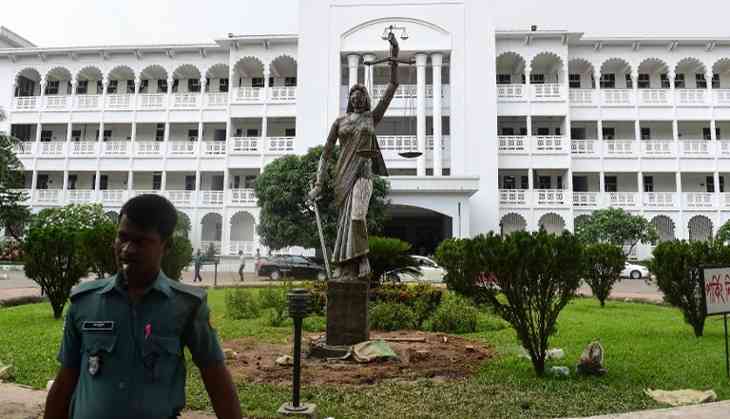Justice statue taken down in Dhaka: why is Hasina playing into Islamists' hands?

The sari-clad statue of Themis, the Greek goddess of justice, at the Supreme Court in Dhaka, was recently taken down under pressure from the Hefazat-e-Islam and reinstalled at the annexe building.
Prime Minister and Awami League leader Sheikh Hasina had openly said she did not like the statue, which was installed in December 2016.
Law Minister Anisul Haq defended the removal with a strange excuse – that the statue was a distortion, since Themis was shown clad in a sari.
Controlling everything
It reminded this reporter of a conversation with an atheist blogger in December 2013, a month before the General Elections, and days after the Jamat-e-Islami's Quader Mollah was hanged. This was a time when Bangladesh was reeling under a spate of hit-and-run attacks by the Jamat cadre, and this reporter was interviewing the blogger outside Dhaka University.
“The Awami League wants to control everything. They want the controls of the Shahbagh movement, and at the same time they also want to control Hefazat-e-Islam,” the blogger had said.
Months before our conversation, he had survived a stabbing attack by suspected members of the radical Jamat-e-Islami. The blogger was later put in jail on charges of blasphemy.
Why would a government which claims to be secular put somebody under arrest on such a charge and legitimise the demands of the Islamist brigade?
The answer is simple: it just want votes. When it sees that the mood is pro-liberation, it takes the side of the pro-liberation secular forces; when the mood is against liberation, it sides with the Islamists.
The blogger had narrated another instance. “In May 2012, when they saw that Hefazat-e-Islam is rising, they allowed them to come to Dhaka and hold a big gathering,” the blogger claimed. Hefazat was protesting against the secular Shahbagh movement, which as the blogger pointed out, had the support of the Awami League.
Opposition to the statue
The Hefazat and the Jamat-e-Islami, meanwhile, have not minced words in articulating their opposition to the the statue.
“Do not play with our religious beliefs, national spirit and heritage. Do not push the country towards the curse of Allah through such anti-Islamic activities,” Shah Ahmed Shafi, the head of Hefazat, was quoted as saying by the Dhaka Tribune after the reinstallation of the statue.
Jamat secretary-general Shafiqur Rahman, too, demanded the removal of the statue, according to the same report.
Political opportunism
Afsan Chowdhury, a known Dhaka-based political commentator, who teaches at the BRAC University, says once the Oikya Jote, a conglomerate of Islamist groups, had come out with their opposition, it was clear that it was the death warrant for the statue.
Chowdhury says the move by the Awami League is pure political opportunism, and has nothing to do with ideology.
“The message to all, including the minorities, is simple: politics and party will always come first,” he says, adding how the move has been taken keeping in mind the elections in 2018.
The Bangladesh Nationalist Party, the principal Opposition, had boycotted the last elections. But this time, it does not look like its leader, Begum Khaleda Zia, will keep away from the crucial polls.
Sheikh Hasina, with her iron fist approach to taking on radical Islamist elements, had carefully cultivated the image of a leader who was not willing to cede to the demands of the fringe Islamist elements.
However, in the electoral game, Hefazat is not 'fringe'. It controls the vast network of mosques in Bangladesh, which the Awami League would like to cash in on.
Chowdhury says the Awami League could not reach a compromise with Jamat, the main electoral ally of the BNP. But with Hefazat, “perceived to be the least radical of the Islamist outfits”, Hasina has had channels of communication open.
Chowdhury says by controlling the Hefazat, the Awami League government is trying to shut down any potential opposition that may arise, if the government was to ignore Hefazat. “The Awami League wants to be seen as mosque-friendly,” he points out.
Secularism takes a hit
A senior BNP functionary had earlier told Catch how the democratic deficit in Bangladesh was the reason for such knee-jerk reactions by the government. The taking down and reinstallation of the statue is the latest knee-jerk reaction. And it has ruffled many who would like Bangladesh to play by the rules of secularism.
“Bangladesh's image as a secular State has indeed been damaged, badly, by this appeasement of the religious extremists. The impression of the country, both among its people and among people abroad, is patent,” Syed Badrul Ahsan, a senior commentator, wrote in an article.
“It is this – that the forces of regression are having a field day in Bangladesh, that a government desirous of gaining the electoral support of the religious Right, has been going out on a limb to acquiesce to its demands,” he wrote.
Ceding to the demands of the Islamist outfits could be a slippery slope in the sensitive Bangladeshi society. As Hasina's minister Hasanul Haq warned: “Any transaction with Hefazat-e-Islam, the Tentul Hujur group, the Razakars, and communal organisations, will be suicidal for Bangladesh. It will harm the Liberation War spirit.”
First published: 29 May 2017, 22:13 IST
